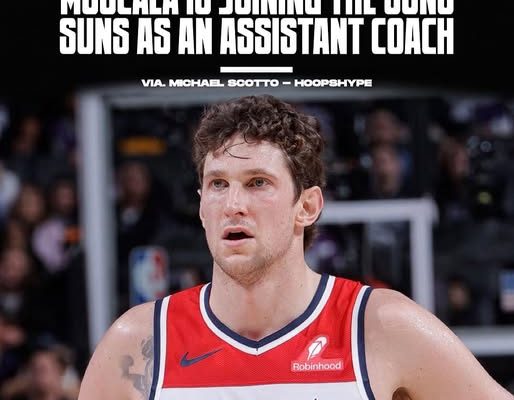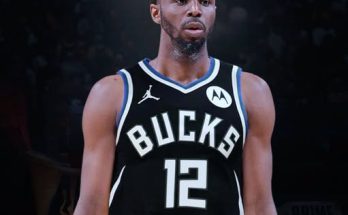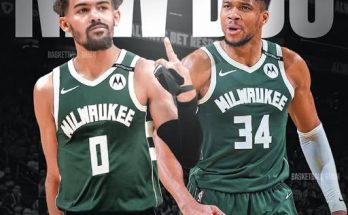Mike Muscala’s basketball journey has always been defined by adaptability, professionalism, and an understated but vital presence on every team he joined. Now, the former 11-year NBA veteran is embracing a brand-new chapter in his life—this time on the sidelines. Just weeks after announcing his retirement as a player at the age of 34, Muscala has accepted a position as an assistant coach with the Phoenix Suns, reuniting with new Suns head coach Jordan Ott, who worked with him during their time together in Atlanta. This transition isn’t just about a job change—it’s a continuation of Muscala’s lifelong devotion to the game and an example of how experience, leadership, and the right relationships can pave the way for a seamless shift from playing to coaching.
Muscala’s playing career was never about flashy stats or All-Star nods. Instead, it was built on consistency, versatility, and an unselfish approach that made him an ideal role player in a league dominated by stars. After being drafted in 2013 by the Dallas Mavericks and immediately traded to the Atlanta Hawks, Muscala began carving out a niche as a reliable stretch big man—a rarity at the time. He could space the floor with his three-point shooting, defend multiple positions, and contribute quietly but effectively to a team’s success. Those qualities kept him in the league for more than a decade, as he suited up for franchises including the Hawks, Philadelphia 76ers, Los Angeles Lakers, Oklahoma City Thunder, Boston Celtics, and Washington Wizards.
His time in Atlanta from 2013 to 2018 proved pivotal, both for his development as a player and for the relationships he formed along the way. Jordan Ott, who at the time was a player development coach with the Hawks, played a role in helping Muscala refine his game. Ott’s coaching style—detail-oriented, collaborative, and player-focused—resonated with Muscala. That early professional bond would later serve as a bridge to Muscala’s post-playing career. In many ways, this move to Phoenix is less a leap into the unknown and more of a return to a familiar working dynamic, but with their roles reversed.
For Ott, who was recently named head coach of the Suns, bringing in someone like Muscala makes perfect sense. The Suns are entering a transitional phase of their own, looking to maximize their championship window with superstars like Kevin Durant, Devin Booker, and Bradley Beal while also building a sustainable culture. Having a coach who has been in the trenches as a player, understands the nuances of locker room chemistry, and can relate directly to current athletes adds a unique dimension to the staff. Muscala’s ability to read the game from a player’s perspective, coupled with his reputation as a consummate professional, makes him a valuable asset in this setting.
What makes Muscala’s transition even more intriguing is how quickly it happened. Often, retired players take months or even years to figure out their next move. Some enter broadcasting, others dabble in business ventures, and some simply take a break from basketball altogether before deciding whether coaching is for them. Muscala wasted no time. His decision to immediately step into coaching speaks to his readiness and passion for the sport. It also shows that coaching was not an afterthought—it was something he had likely been preparing for mentally long before hanging up his sneakers.
In recent years, the NBA has seen a rise in younger assistant coaches, many of whom are fresh off their playing careers. This trend reflects a broader understanding that recent players often have a strong grasp of the modern game’s pace, spacing, and evolving strategies. Muscala’s experience stretching the floor as a big man fits perfectly into today’s offensive schemes, and his knowledge of defending versatile lineups will be invaluable in helping the Suns address some of their biggest on-court challenges. His insight into role-player mentality—how to stay engaged, ready, and effective without the ball in hand—can also benefit Phoenix’s bench unit, which will need to provide critical support during long playoff runs.
Another factor in Muscala’s appeal as a coach is his reputation off the court. Former teammates and coaches have consistently praised his work ethic, humility, and willingness to mentor younger players. He wasn’t the loudest voice in the locker room, but when he spoke, it carried weight. That balance of quiet leadership and accountability is exactly what teams hope to cultivate in their culture, especially one with championship aspirations like the Suns. In an era where personalities and egos can sometimes overshadow the collective goal, Muscala represents the kind of grounded, team-first mentality that championship squads are built on.
The Suns’ decision to hire Muscala also signals a recognition of the intangible elements that fuel success. Phoenix already has elite talent, but in a league where small margins often decide outcomes, having a coaching staff that can connect with players on both a personal and tactical level is critical. Ott’s familiarity with Muscala ensures there will be immediate trust and alignment on vision, philosophy, and work ethic. This can help the Suns’ coaching staff operate more cohesively, which in turn can speed up the process of implementing new systems and building rapport with the roster.
Muscala’s journey from undrafted prospect to NBA mainstay and now assistant coach is a story of persistence. Coming out of Bucknell University, he wasn’t a household name. The Patriot League isn’t typically known as a breeding ground for NBA talent, but Muscala’s skill set and determination earned him a spot in the league and kept him there for over a decade. That same perseverance will be essential in his coaching career, especially in a competitive environment like the NBA, where success often depends on an ability to adapt quickly to challenges.
While the specifics of Muscala’s role with the Suns have yet to be detailed, it’s safe to assume he will be heavily involved in player development, particularly with Phoenix’s big men. His experience playing alongside and against some of the best forwards and centers in the game gives him a unique perspective on how to prepare for elite competition. He can offer insights on positioning, spacing, pick-and-roll reads, and defensive communication—all crucial elements for a team aiming to go deep into the playoffs.
Phoenix’s front office has been aggressive in shaping a team capable of contending in the Western Conference, but with stars comes the challenge of managing expectations and keeping everyone bought into the system. Muscala’s even-keeled demeanor and firsthand understanding of the grind could help balance the intense competitive energy that comes with a roster led by Durant, Booker, and Beal. His presence might not make headlines in the same way as a blockbuster trade, but it could have a meaningful impact on the Suns’ long-term cohesion and performance.
In the grander scope of NBA history, many former players have successfully transitioned to coaching, but the ones who make the biggest impact often possess a combination of tactical knowledge, emotional intelligence, and the ability to build relationships. Muscala checks all of those boxes. His coaching career may be in its infancy, but his foundation is solid, and the opportunity in Phoenix provides an ideal platform to grow.
This hiring also reflects the interconnected nature of the NBA, where professional relationships formed years earlier can resurface in powerful ways. The Muscala-Ott reunion is a reminder that trust, respect, and shared history often matter just as much as talent when it comes to building a successful team. As the Suns prepare for the upcoming season, those bonds could be a hidden advantage, allowing them to hit the ground running while other teams are still adjusting.
For Muscala, this is the beginning of a new era. The transition from player to coach will undoubtedly come with challenges—coaches see the game from a different angle, and influencing outcomes requires a different skill set than executing them on the court. But given his track record of embracing every role asked of him, it’s hard to imagine him doing anything but thriving in this new position. His move into coaching isn’t just a career shift—it’s a continuation of his lifelong love for basketball, an evolution that feels both natural and inevitable.
The Suns, meanwhile, are betting that Muscala’s blend of recent playing experience, strategic understanding, and personal connection to the head coach can help them navigate the grueling NBA season ahead. For a team with high ambitions and a narrow championship window, every advantage counts. And while the headlines may focus on the stars, sometimes it’s the quieter moves—like adding a respected voice to the bench—that make all the difference when the games matter most.
If this transition goes as smoothly as it appears on paper, the story of Mike Muscala might serve as inspiration for other players nearing the end of their careers, showing that there’s life after the final buzzer—and that sometimes, the next chapter can be just as rewarding as the first.



